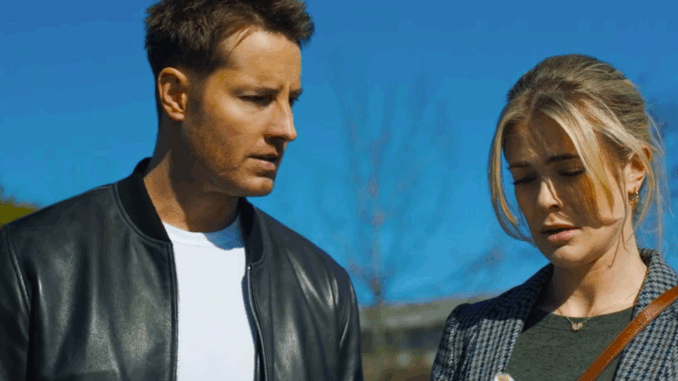
When CBS launched Tracker, it was billed as a weekly adventure drama about a rugged survivalist helping strangers in need. But viewers quickly discovered the show had another layer, one that transformed it from episodic television into something far more addictive: the unresolved, unsettling mystery of Colter Shaw’s family.
This thread — the shadow of a father’s paranoia, the scars of a fractured home, and the puzzle pieces that refuse to fit — has quietly become the show’s emotional backbone.
The Father’s Shadow
Colter Shaw, played by Justin Hartley, isn’t just chasing missing persons and runaway fugitives. He’s chasing ghosts. At the heart of his personal story lies Ashton Shaw, his brilliant but disturbed father, whose survivalist teachings made Colter the man he is today — and perhaps broke him in the process.
From the earliest episodes, the show seeded doubts about Ashton’s death. Was it an accident? Suicide? Or was it murder? The ambiguity surrounding this event mirrors Colter’s own uncertainty about who his father truly was: protector or tormentor, genius or madman.
The mystery of Ashton isn’t a footnote. It’s the fuel behind Colter’s restless drifting, his need to solve puzzles, and his inability to settle down. Each new case he takes feels like a reflection of the unsolved case at the center of his own life.
A Fractured Sibling Bond
Then there’s Colter’s complicated relationship with his siblings, Russell and Dory. Unlike Colter, they chose different paths, splintering under their father’s intensity. The show has explored their estrangement, teasing painful confrontations and uneasy alliances.
When Colter reconnects with them, sparks fly — not just emotionally but narratively. Fans have responded strongly to these family episodes, noting that they carry more weight than even the show’s most explosive rescues. Seeing Colter face his family forces him to confront the boy he was before he became the man audiences now root for.
It also makes for some of the show’s most layered writing. Sibling resentment, betrayal, and lingering loyalty form a tangle that no amount of survival skills can cut through.
Why the Mystery Matters
Some might argue that Tracker could survive on its case-of-the-week format alone. But the family arc is what elevates it. Without it, Colter risks becoming a nomadic detective with little to tether him emotionally. With it, he becomes a man defined as much by what he runs from as what he chases.
Fans online often point out that the family mystery turns Tracker into “more than just TV comfort food.” It makes the audience question not just what happened to Ashton Shaw but what it means for Colter’s future. Can he ever reconcile the trauma of his childhood, or will he forever be defined by it?
Hartley’s Personal Touch
![]()
Justin Hartley has hinted in interviews that Colter’s family arc is the heart of the show for him personally. He’s praised the writers for balancing action with psychological depth, noting that audiences “want to know the man behind the tracker.”
It’s clear Hartley relishes these moments. In his hands, Colter isn’t just a rugged adventurer — he’s a son haunted by memory, a brother torn by guilt, and a man who can track anyone but struggles to find himself.
Where the Story Goes Next
With Season 3 on the horizon, Tracker seems poised to dive even deeper into the Shaw family. Rumors suggest new revelations about Ashton’s death, possible hidden truths about Colter’s upbringing, and further exploration of how his siblings fit into the puzzle.
If true, it could reshape the series. Solving the mystery might bring closure — or it could unravel Colter completely. After all, in Tracker, every answer tends to raise new questions.
Why Viewers Can’t Look Away
At its core, the Shaw family mystery works because it’s universal. Everyone has a past they can’t quite shake, a parent they didn’t fully understand, or a sibling relationship that feels unfinished. Tracker just amplifies those truths with danger, tension, and survivalist grit.
And that’s why the family arc has become the show’s beating heart. Yes, the rescues are thrilling, and yes, the guest stars add sparkle. But the true reason audiences keep coming back is to see whether Colter Shaw can ever solve the one case that matters most — his own.
